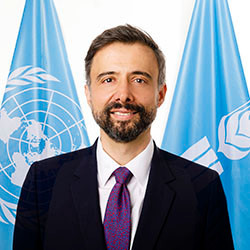G7 Agriculture Ministers’ Meeting Side Event: Widening private sector engagement for Sustainable and Resilient Food Value Chains
IFAD Asset Request Portlet
ناشر الأصول
G7 Agriculture Ministers’ Meeting Side Event: Widening private sector engagement for Sustainable and Resilient Food Value Chains
Statement by Alvaro Lario, President of IFAD
من Alvaro Lario
موقع: Japan
21 أبريل 2023Check against delivery
My thanks to everyone who has joined us today and to the Government of Japan and the City of Miyazaki for your generous hospitality.
As some of you may know, IFAD is the international financial institution exclusively dedicated to investing in small-scale farmers and poor and vulnerable rural people. And as both a specialized United Nations agency (one of the Rome based food agencies) and an international financial institution, we invest in sustainable, inclusive and resilent food systems.
The video you just saw shows how everyone benefits from partnerships between small-scale producers and the private sector when these partnerships are transparent, honest, and fair.
There are clear business incentives for the private sector to invest in rural areas. These include diversifying supply chains, contributing to the sustainability of their operations, and fulfilling social responsibility commitments.
For governments, there are also clear advantages. More productive small-scale farms and fisheries can help feed more people, boost local economies and markets, fight inflation, and create new avenues for local, regional and international trade.
And, of course, there is the national and global public good of creating the conditions for more sustainable food production, greater food security, and a more inclusive, equitable and stable world.
IFAD has been working with the private sector since its inception. We believe farming is a business. Over the decades, we have fine-tuned and intensified this collaboration. Today, more than 90% of ongoing IFAD-supported projects invest in supply chain approaches that contributes to the inclusion and empowerment of poor rural women and men into agricultural value chains.
IFAD's comparative advantage lies in its deep understanding and experience of both the demand and supply sides of building fair and profitable relationships between the private sector and small producers.
Our model for engaging with the private sector is organized around three pillars. First, creating an enabling environment for the private sector to work with small-scale farmers and rural small and medium enterprises. Second, catalyzing private sector investment into rural areas by providing funding for responsible companies operating across food systems. And, third, providing investment platforms to assemble large-scale funding from businesses and financiers.
This model builds on our long experience of partnering with the private sector. Over the last 40 years IFAD has brokered many public-private-producer partnerships – what we call 4Ps -- that benefit government, the private sector and small-scale farmers alike.
In Viet Nam, for example, we established a 4Ps between the government, a large domestic processing company, and farmers. The processing company entered into long-term agreements with the farmers, committing to buy 100% of their produce at a fair price. It also supported farmers in switching to organic coconut production by providing inputs training and quality verification. As a consequence, the income of farmers nearly doubtled and over 700 jobs were created.
In Sudan, a 4P was established between an IFAD project, producer groups and the three seed companies. While the project built the capacities of participating farmers, the companies provided additional technical assistance and engaged farmers through contract farming for the procurement of seeds.
As a result, 489 metric tons of certified seeds on a total area of about 1900 hectare were produced, and nearly 300 seed growers accessed advisory services for seed production and they transferred the information to additional 853 seed growers.
As these examples and the case with Mars show, IFAD brokers partnerships which bring together the capacities and interests of all parties in ways that are mutually beneficial, fair and transparent.
It is IFAD’s ambition to channel additional private investment into the agri-food systems, and to forge stronger links between private companies and small-scale producers.
The challenges confronting global food systems are well known. With more effective public and private collaboration it is possible to turn these challenges into opportunities for small-scale farmers and for poor and vulnerable rural women and men most at risk of being left behind.
Current and traditional agriculture and food policies and approaches will not ensure food security and nutrition for a growing global population, nor address climate change, protect biodiversity, sustain the environment, and enable livelihoods for all. New and innovative approaches are urgently needed. And this is where IFAD comes in.
